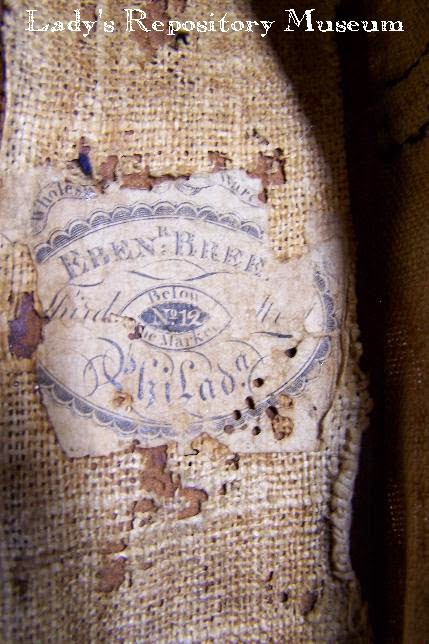Guest blogger
Meaghan Reddick
Independent Scholar and recent M.A. graduate, George Mason University
 |
| Courtesy, Delaware Historical Society More information� On a search for American shoemakers labels from the eighteenth to early nineteenth century, the label �Ebenezer Breed, Philadelphia� turned up three times as I scoured collections from Virginia to New England. It is remarkable to find more than one example of any given early American shoemaker�s labeled craft, yet Breed�s shoes are found in the Delaware Historical Society, the Maryland Historical Society, and the private collection of the Lady�s Repository Museum. The existence of three pairs hinted of a wide circulation, which required a deeper look into who Breed was and how his shoes had been saved. |
 |
| Wedding shoes of Dorcas Armitage Lewis, made by Ebenezer Breed. Worn c.1790. Courtesy, Delaware Historical Society |
 |
| Courtesy, Lady's Repository Museum |
 |
| Painted Waiter depicting Ebenezer Breed (far right) being introduced to a British Merchant, painted by Benjamin West, 1792. Courtesy, Lynn Museum |
Soon after the American Revolution had ended, French and English shoes were being sold at a cheap rate which was discouraging for American shoemakers. With the support of other Philadelphia merchants, Breed played the role of lobbyist and proposed to Congress for a protective tariff to be placed on imported shoes and boots. Congress was at the time holding their sessions in Philadelphia. At various dinner parties hosted by his Quaker allies who offered up their large homes, Breed was able to demonstrate his passion for the protective tariff. The most successful dinner party was held in honor of James Madison. �Charming ladies�, including Miss Dolly Payne, insured the attendance of certain Congressmen and other government officials. That evening, shoes were discussed between every course and by the end Breed had persuaded Madison to place a high duty on shoes and boots.
The demand for American-made shoes rose significantly in the 1790s, with the help of protective tariffs and the events of European wars. The increased demand for American-made shoes is illustrated by the proliferation of labels and branding found in women�s shoes that began during this period and expanded throughout the nineteenth century. With help from Breed, these developments made America a global leader in shoe manufacture.
About Meaghan Reddick
Meaghan recently earned her M.A. in History of Decorative Arts from George Mason University. Her thesis focused on early American shoemakers, their labels, and their links to American economic independence. Her advisor was Professor Mary Doering and I was honored to be a reader for her thesis. This post offers a window into her important research.
 |
| Sample American shoe label Courtesy, The Connecticut Historical Society |
Meaghan recently earned her M.A. in History of Decorative Arts from George Mason University. Her thesis focused on early American shoemakers, their labels, and their links to American economic independence. Her advisor was Professor Mary Doering and I was honored to be a reader for her thesis. This post offers a window into her important research.

0 Response to "Ebenezer Breed and the Emergence of a Modern American Shoe Industry"
Post a Comment